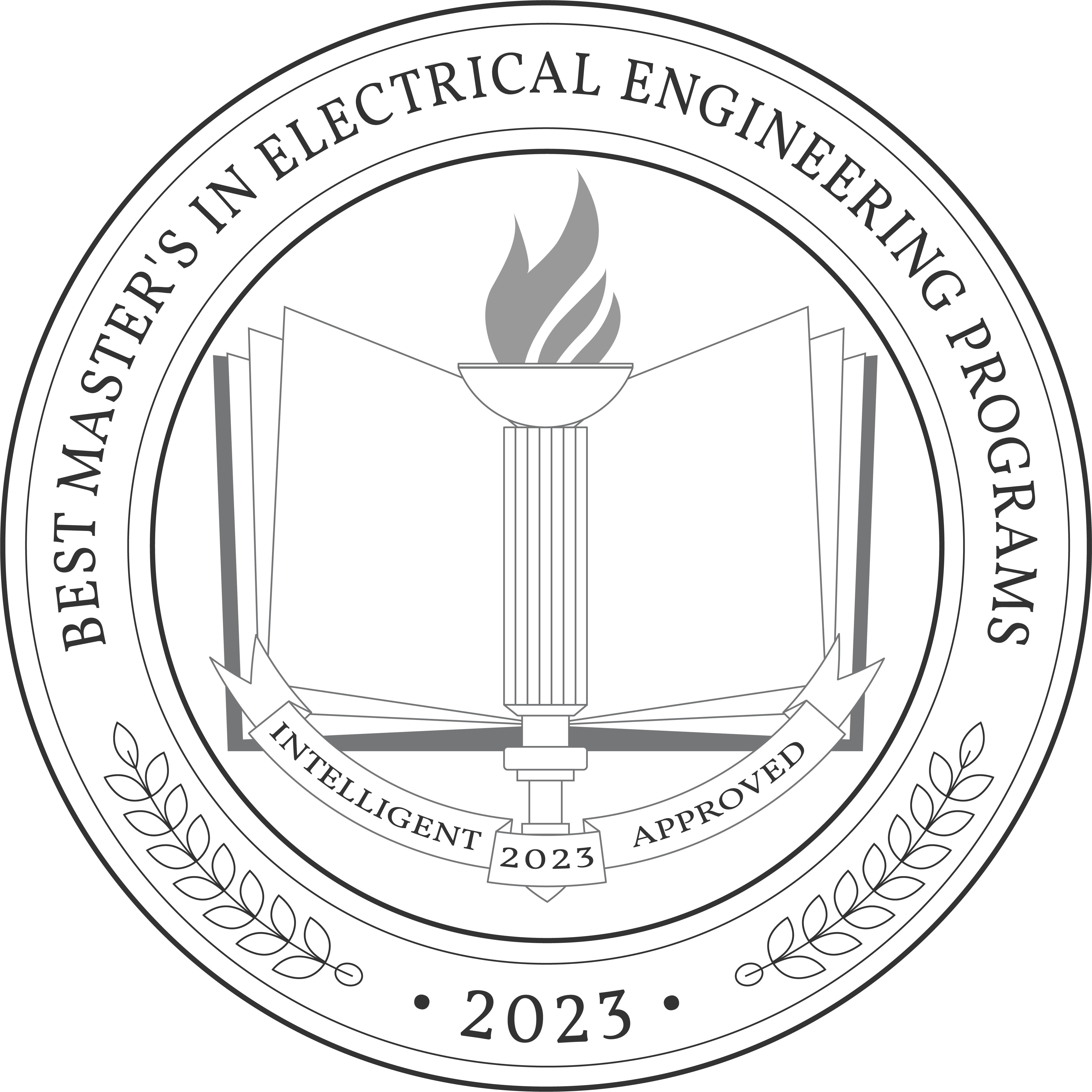Why This Matters
-
ELECTRICAL ENGINEERS WITH MASTER’S DEGREES HAVE MANY CAREER PATHS
The most popular specialty areas for electrical engineering students to pursue include electronics, microelectronics, signal processing, power, controls, telecommunications, instrumentation, and computer engineering
-
THE FIELD IS EXPECTED TO GROW BY 5% IN THE NEXT 10 YEARS
According to the Bureau of Labor Statistics, the need for electrical engineers is expected to grow by 5% over the next ten years. Much of this is due to the rapid pace of technological innovation.
-
EARN 19.4% MORE PER YEAR WITH A MASTER’S DEGREE
Generally speaking, graduates with a master’s degree earn an average of 19.4% more than those with only a bachelor’s degree, and the highest-paid positions in electrical engineering often require a master’s degree.
Our Research
Electrical Engineering is a science and math-related field, and the degree programs highlighted on our list generally award either Master of Science degrees or Master of Engineering in Electrical Engineering & Computer Science degrees. The programs represent a range of delivery methods including strictly online, strictly on-campus, and a combination of the two. Many of the online programs are available asynchronously, allowing distance learners to earn their degree on their own schedule, while those that represent hybrid programs of online and in-person classes are generally offered synchronously.
Accreditation of a Master’s in Electrical Engineering program is extremely important. Not only does it ensure a high-quality education that meets the rigorous standards of the accrediting agency, but in many cases, having graduated from an accredited program is required in order to qualify for certain positions at the federal level or professional examinations. All of the programs included here are fully accredited by one of the regional or professional accrediting agencies.
We evaluated each program on the basis of flexibility, faculty, course strength, cost, and reputation. Then we calculated the Intelligent Score for each program on a scale from 0 to 100. For a more extensive explanation, check out Our Ranking Methodology.
- 68 hours to write this article
- 173 universities and colleges we assessed
- 243 education programs we compared
The Top 49 Master’s in Electrical Engineering Degree Programs

Discover More Options
What You Should Know About This Degree
Engineering is a field that requires creativity, problem-solving skills, and an aptitude for math. But there are many different types of engineers, and there is a significant difference between mechanical engineers and electrical engineers. While electrical engineering is dedicated to the generation of power, whether that is developing new ways of using electricity or other energy sources or troubleshooting problems or inefficiencies, mechanical engineers focus on power’s application — they get parts, motors and components to act in a certain way.
Electrical engineers and mechanical engineers often work for the same companies and on the same projects and often share similar skills. The curriculum for a master’s degree in electrical engineering often overlaps that of the curriculum for a Master’s degree in mechanical engineering.
Each academic institution makes its own decision as to which accrediting agency it works to meet the requirements of, but it is essential for any program offering a Master’s in Electrical Engineering degree program to be accredited. One of the most highly-respected accrediting agencies for this type of program is ABET, or the Accreditation Board for Engineering and Technology.
There are over 40 different national certifications available for electrical engineers, ranging from certificates in residential electronics to certification in critical infrastructure protection. Some are related specifically to military occupational specialties and other industrial settings. Choosing the core and advanced certifications appropriate for you to pursue will depend upon the industry you plan to work within.
What’s Next?
Here are some questions to ask when researching Master’s in Electrical Engineering programs:
- Am I eligible for this program? Admission to most Master’s in Electrical Engineering programs requires a four-year bachelor’s degree in a STEM or related field from an accredited institution in the United States or similarly accredited international program. Applicants will most likely need a minimum GPA of 3.0 out of 4.0, though some programs may have more demanding expectations. Students will need to submit transcripts sent directly to them from the colleges and universities that they have attended. Some schools may require the GRE (Graduate Record Examination), and international applicants will likely need to submit scores for the TOEFL (Test of English as a Foreign Language). Letters of recommendation, a resume, and a personal essay or statement are also likely to be required.
- How long does it take to complete this degree online? Most Master’s in Electrical Engineering degrees require at least 30 credits to graduate, though some require as many as 45. Students attending schools requiring just 30 credits are generally able to complete the program within one year if they are studying full time, while students pursuing part-time or online programs generally take two to three years to complete the program.
Admission into a Master’s program in Electrical Engineering is extremely competitive, so it is important that those pursuing this path pay attention to the deadlines set out by each of the programs and adhere to them meticulously.
Financing your studies for a Master’s in Electrical Engineering can be a challenge. The programs generally cost a minimum of $15,000 for an online program, and can go higher than $50,000 for an in-person program. Those seeking financial assistance can look to federal and state scholarships and loans as well as tuition reimbursement from employers. By filling out the Free Application for Federal Student Aid, you will give yourself a sense of how much financing you are eligible for and how much you will need.